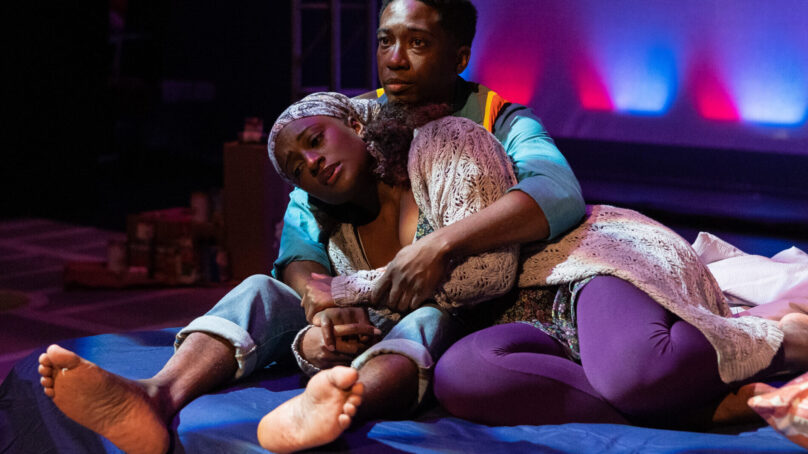

Photo courtesy of Morgan Sophia Photography
Roderick Randle and Bretta-Raia Curah play a futuristic couple living in a world near collapse in the short play, And Other Dreams We Had.
By AARON KRAUSE
This year’s version of City Theatre’s popular annual short play festival, Summer Shorts, is a love letter to Miami and a celebration of the region’s diversity.
Specifically, this year’s edition, the 26th annual, runs through June 25, features eight world premiere short plays penned by Miami BIPOC/Latinx playwrights (Black, Indigenous, and People of Color), reflecting the region’s many cultures. Officially, this year’s version is titled Summer Shorts: Homegrown Edition.
This year, for some reason, the printed program does not match the actors with the roles they portray. And it would help if City Theatre included subtitles with the Spanish phrases that elicited laughs from audience members who obviously understand Spanish. That way, everyone can laugh.
With that out of the way, the pieces this year are generally relatable, funny, and touching.
The playwrights have honed their pieces with master playwright Vanessa Garcia. Her play, #Graced, experienced its world premiere production last month in the same space that Summer Shorts takes place. Specifically, it is the intimate Carnival Studio Theater in the Ziff Ballet Opera House at the Adrienne Arsht Center for the Performing Arts in downtown Miami.
Act One of this year’s festival offers four comedies, while the second act’s skits feature more serious themes.
During transitions between the playlets, we see video on a projector screen of a car passing through Maimi’s many neighborhoods. Also, the video projection screen enhances the set design. For instance, in one mini play set in a hospital, we see a bed and other hospital equipment on stage. Meanwhile, on the screen, we see the photo of the front entrance to a local hospital.
The best short plays skip or strictly limit exposition, quickly introduce the piece’s conflict, possess a clear focus, and feature a clear beginning, middle, and end. Some of the short plays in this year’s lineup fare better than others in the above areas.
I Found This on the Web, by Ivan R. López, is one of the line-up’s stronger pieces. Namely, the playwright humorously conveys the piece’s message that artificial intelligence is becoming more pervasive in our lives. But have we reached the point in which it may overtake our lives, the playwright seems to ask.
In I Found This on the Web, Marcos is nervous as he waits for Jake in a restaurant. Soon, Siri, speaking from Marco’s phone and watch, begins offering her opinions about the date Marcos is on with Jake.
“I spoke to Alexa,” Siri says. “Stop trying to be someone you are not.”
“Stop staring into my soul, Siri!” Marcos responds after the persistent Siri keeps offering her opinion.
The play, with solid direction by Alex Alvarez, is consistently hilarious and features convincing performances by actors who demonstrate deft comic timing.
Alvarez, who has performed in numerous City Theatre festivals, also directed the short play 7 in this year’s lineup. The poet-turned-playwright Lolita Stewart-White penned the brief play.
The setting is the dressing room of a chapel in South Miami’s Richmond Heights neighborhood. Further, the playwright has set the piece during a time when married couples must follow a federal law requiring them to renew their vows every seven years; if they do not, the marriage becomes nullified.
More specifically, in 7, Kayla, a gorgeous and nervous character, is wearing a bridal gown. However, she is uncertain about her next move. Both of her sisters encourage her to renew her vows with husband Curtis. However, Kayla has just crossed paths with her ex, Troy. What should she do? Kayla’s elder sister, Nubia, encourages Kayla to stick with her husband.
7 is a relatable, funny piece, and Alvarez directs it with comic energy.
In addition to I Found This on the Web, one of the lineup’s strongest pieces is Banana Bread, by Sefania Richard Galon. At least one character has a clear, strong objective, but faces a formidable obstacle that may prevent the character from achieving it.
Tyrone and Sebastian are coworkers at a coffee shop-like venue, Banana Bread. When Tyrone learns about a supervisory position that is open within his company, he decides to apply. But before the day is over, a couple of demandingly hilarious customers overwhelm Tyrone, and the customer service he offers them is less than exemplary. Will the boss learn about Tyrone’s demeanor and decide not to consider him for the management position? The playlet ends surprisingly.
Joshua Jean-Baptiste directs with a focus on the well-written piece’s comedy. As a result, laughs flow. The acting is strong. For instance, the actor portraying Tyrone conveys a strong, believable desire to land the management job.
While Banana Bread includes a surprising ending, so does Luis Roberto Herrera’s humorous playlet, Plastic Flowers. It centers on two estranged co-workers, Thaylee and Raia. Unfortunately, for them, they are visiting a comatose colleague in the hospital at the same time.
Raia has brought a bouquet of plastic flowers for the patient, and she and Thaylee argue about whether real flowers or fake flowers are best to gift to someone. Soon, profanity and insults fly between the pair. And Thaylee feels guilty about the last thing she told the patient before she landed in the hospital. A surprisingly comic ending wraps up Plastic Flowers, which Maha McCain directs with flair.
McCain also deftly directs a cautionary playlet, the dark, intense, and disturbing And Other Dreams We Had by Phanésia Pharel. Before the main action begins, we watch a video showing the world deteriorating, complete with pollution, flooding, and destruction. If the video instills you with an uncomfortable feeling, you are probably not alone.
In And Other Dreams We Had, Jules and Mason are a couple facing a crisis. Namely, they find themselves stuck in an attic during a year well into the future with a baby on the way. Would they be doing the right thing by bringing a baby into a world plagued with climate change and so much destruction? Although they feel torn and are surviving on canned food, their love for each other keeps them strong. This is an affecting, poetic piece that reminded me of Duncan Macmillan’s play, Lungs. It also centers on a couple trying to decide whether bringing a baby into this troubled world is the best idea.
Meanwhile, teenage girls populate the playlet, The Vultures. It’s a layered piece about three girls who have just completed middle school. It wasn’t a happy time for Jade, Hazel, and Riley. However, Jade sets her sights on reinventing herself and her friends with original social media personas that hopefully will keep bullies away.
The Vultures is blessed with surprises and is emotionally complex, and Melissa Almaguer smartly directs the piece. She coaxes believable performances from cast members.
Almaguer also directed Balloo(n), by Joel Castillo. It’s a piece infused with emotional depth and relatability. In the playlet, Olivia and Jason, Miami residents on their honeymoon, travel to Havana. Olivia wishes to explore her family’s history, while Jason simply wants to support his love and experience adventure.
This is a piece in which one of the characters, namely Jason, changes for the better by the end. Ultimately, Balloo(n) is an emotionally satisfying playlet in English and Spanish. Again, subtitles would help for the Spanish parts.
The playlet 2201: Xibalba, by Chris Anthony Ferrer, is a complex space farce that can confuse audiences who don’t pay close attention. The piece takes place aboard the Space Station Xibalba during a year well into the future. Multiple disasters occur and multiple personalities converge as the crew is about to celebrate the new year. If you like science fiction, 2201: Xibalba might be for you. If you are not into that genre, you may feel like tuning out.
But overall, this year’s edition of Summer Shorts features skilled actors, directors, designers, and playwrights. And kudos to City Theatre for giving BIPOC and Latinx playwrights a chance to tell their stories.
Speaking of City Theatre, its mission is to develop new work predominantly in the short play genre and produce longer works that engage and impact the community. According to its website, City Theatre is the only professional theater company in the U.S. dedicated to creating and producing 10-minute plays and musicals year-round for all ages.
Summer Shorts: Homegrown Edition runs through Sunday, June 25 in the Ziff Ballet Opera House at the Adrienne Arsht Center for the Performing Arts. The address is 1300 Biscayne Blvd. in Miami. Performances run at 7:30 p.m. Thursday and Friday, 3 and 7:30 p.m. Saturday, and 3 p.m. Sunday. Ticket prices range from $50-$75. Student tickets are $15 with an I.D. For more information, call (305) 949-6722 or go to www.arshtcenter.org.



